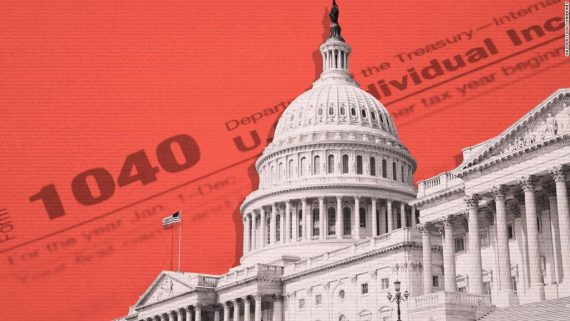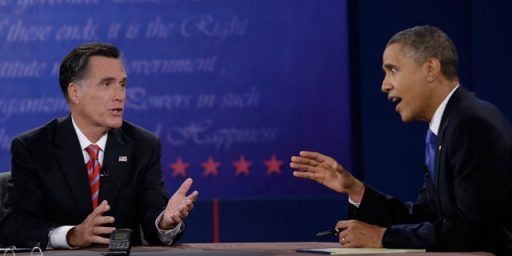Tax Reform, Once The GOP’s Midterm Hope For Survival, Is Becoming Less Popular
Republicans have been hoping that the tax bill passed in December would help them in the midterms. That's appearing to be less and less likely by the day.
It’s already fairly clear that Republicans face an uphill battle heading into this year’s midterm elections, and that control of at least one, and possibly both, Houses of Congress stands in the balance seven months away from Election Day. First of all, historically speaking it’s been the general rule that the incumbent President’s party tends to lose seats in Congress even if they don’t lose control of either the House or the Senate. The only recent exception to this rule can be found in the 2002 midterms when Republicans gained seats in both the House and in the Senate and in fact regained control of the Senate after having lost it when Vermont Senator Jim Jeffords switched his support to the Democratic Party in 2001. Second, as I noted yesterday, while the Generic Congressional Ballot has shown the race between Republicans and Democrats tightening in recent months, there are a number of factors that still point in favor of Democrats going forward.
Notwithstanding these headwinds, Republicans have been hoping that there would be some factors that would help them blunt the force of the coming blue onslaught. Primary among those has been the tax reform bill that was passed by Congress and signed into law in December. From the beginning, Republicans have contended that this bill would boost economic activity and lead to boosts in wages and economic activity that would enure to the benefit of pretty much the entire American workforce to such an extent that it would help them at the ballot box. At least initially, it appeared that they might be right about this. In the immediate aftermath of the passage of the new tax law, several large American employers announced wage increases or bonuses to employees that they said were tied to the new tax bill. In retrospect, it appears that many of the critics of the tax bill who said these announcements that bonuses and wage increases were due to the tax bill were mostly meant to curry favor with President Trump may have been correct, especially in light of reports that most corporations seem to be recycling the increased revenue they’re seeing from lower taxes into stock buybacks rather than wage increases, new hiring, or expansion of their businesses. Now, there’s increasing evidence that the hopes the GOP may have had that the tax reform bill could save them from utter disaster in November may be fading.
The first piece of evidence in this regard comes in the latest poll fromThe Wall Street Journal that shows that the tax bill has become less popular than it was back when the law was initially passed:
As congressional Republicans fight to preserve their majorities, they may need to find a weapon more powerful than the big December tax cuts.
The new NBC News/Wall Street Journal poll shows that the tax-cut law, never broadly popular, has sagged in public esteem lately. Just 27 percent of Americans call it a good idea, down from 30 percent in January. A 36 percent plurality call it a bad idea, while the rest have no opinion.
Moreover, a majority gives thumbs-down on the plan when asked to consider its potential effects. Just 39 percent foresee a positive impact from a stronger economy, more jobs and more money in their pockets; 53 percent foresee a negative impact from higher deficits and disproportionate benefits for the wealthy and big corporations
“Not a great starting point” for the fall campaign, said Fred Yang, a Democratic pollster who conducted the survey with Republican counterpart Bill McInturff. The telephone poll of 900 adults, conducted April 8-11, carries a margin of error of 3.27 percentage points.
Republicans began learning that lesson last month during a special House election in Pennsylvania. GOP strategists found the tax cuts an ineffective message against the Democratic candidates and dropped the issue as Election Day approached.
The Democratic victory in a district President Donald Trump had won by 20 percentage points in 2016 showed that tax cuts are “a political loser,” says David Wasserman, a House analyst at the Cook Political Report.
The question now is how much effort GOP candidates sink into improving their stance on the tax-cut issue. They retain some advantages: Men still favor the tax cuts, although less strongly than women oppose it; so do rural residents, older men, and men without college degrees.
Yet working-class, middle-class and upper-class Americans all hold negative views of the tax-cut law. Women who have graduated from college call the tax cuts a bad idea by nearly a 3-to-1 margin.
Perhaps of even more concern to Republicans than this recent polling is the fact that Americans seem to have lost interest in the tax law:
President Trump went to West Virginia this month to talk about tax cuts, but he got a bit distracted. He talked about China, the North American Free Trade Agreement, border security, “sanctuary cities” and states he won in 2016. Eventually he turned to his prepared comments on taxes.
“This was going to be my remarks,” he said, holding up a sheet of paper. “It would have taken about two minutes, but” — and here he threw the paper over his shoulder — “to hell with it. That would have been a little boring. A little boring. Right. Now I’m reading off the first paragraph, I said, ‘This is boring.'”
If Mr. Trump has lost some interest in the $1.5 trillion tax overhaul that he signed into law last year — even though the White House keeps scheduling events to promote it, including one in Florida on Monday — well, the country is right there with him. A brief flurry of activity is planned this week by supporters and opponents of the new law, to coincide with Tuesday’s filing deadline for 2017 income taxes. But otherwise, by all sorts of metrics, Americans aren’t talking very much about a law that Republicans had hoped to make a centerpiece of their midterm election message.
Consider one of Mr. Trump’s preferred yardsticks: cable news coverage. Throughout the fall, as Republicans rushed their tax bill through Congress in two breakneck months, CNN, Fox News and MSNBC routinely devoted 10 percent of their daily coverage to tax issues, according to data from the Gdelt Project. Interest spiked as Mr. Trump signed the bill in late December, and then it fell precipitously.
Several topics on cable have displaced taxes. In March, mentions of the word “Stormy” spiked on MSNBC and CNN, for example. All three networks have begun talking more about “trade” over the past two months, as Mr. Trump imposed tariffs on steel and aluminum imports and threatened additional tariffs on products imported from China.
Even Mr. Trump has struggled to keep his focus on tax issues since signing the bill. He tweeted the word “tax” about as much from January through the end of March as he did in December alone. His overall discussion of taxes — in speeches, interviews, news conferences, videos and Twitter — also declined through the end of March from late last year. Instead, Mr. Trump is talking and tweeting more about trade.
Congressional Republicans have pushed hard to keep tax cuts in the news, in the belief that they will be a potent electoral weapon for the fall. So have liberal organizers, who have held rallies protesting the overhaul throughout the winter and early spring, believing that opposition to it will galvanize support for Democratic candidates in the midterm elections.
For two months after the bill passed, it appeared that Republicans, buoyed by a surge of corporate employee bonus announcements linked to the new law, were right to press their case. The law’s poll numbers improved from dismal levels before its passage. But as those bonus announcements died down — and the conversation around the law died, too — public support waned again. Interviews with voters in swing states suggest that the law may not have much power to move them to support Republicans this fall, and the party abandoned tax-themed ads in a special House election in Pennsylvania last month.
Given the amount of new material that appears in the news nearly every day thanks to Presidential tweets and other issues, it’s not surprising that there would be less discussion about the tax cuts now than there was when the bill was before Congress back in December. At the same time, though, the fact that the President himself has lost interest in talking about the tax cut bill he was hailing just four months ago is a strong indication that this is unlikely to be something that will compel voters to rush to the polls on behalf of Republicans come November, and that could prove to be a big problem for them.







Because, really, no one is seeing it.
The people who need the money aren’t getting it…think Paul Ryan’s infamous example of the teacher who is getting $1.50 a week extra…and the people, like me, who don’t need it are just banking it.
It’s just one more example of trickle down economics failing.
The bonus announcements were just PR…by far most of the corporate money is going into stock buy-backs.
IT WILL NEVER TRICKLE-DOWN!!!
Live by the tax cut, die by the tax cut.
A banquet for the rich, and whatever crumbs that fall to the floor for working people. Crumbs don’t make a satisfying meal and people are unlikely to give a five star review. The rich are getting richer even faster, working people are static and in relative terms continuing their decline. And the GOP thought that was a vote getter?
That aside, this poll shows what every poll shows now. 40% in the cult, 50% opposed to the cult, and 10% are too busy to talk to pollsters. We have here the triumph of Identity Politics, but the relevant identities are Team Red and Team Blue.
And 1998, though I suppose it depends whether you define that as “recent.” Before that, you have to go all the way back to 1934.
OT, but why is the Preview option not working? It keeps giving me an error message every time I click on the button.
I suspect the dip in the polling on this question is related to its being tax day.
Oh, it just didn’t go far enough. If you were to add subsidies for caviar, champagne, first class airline tickets, private jet leases, yachts, luxury cars, etc. the rich would buy/use more of them and the effects on wages will be so huge, you’ll be able to spot them with a regular electron microscope.
@Kathy: You got a sneak preview of the GOP’s bill being introduced this week, didn’t you?
Giving a million-dollar tax break to Sam Walton’s idle rich grandkids isn’t causing their working-poor employees to vote GOP more enthusiastically? It beggars belief.
@teve tory: But won’t the proles take their extra $2 a week and be grateful to their betters? What’s it take to get a vote exactly?
What’s happening recently at the State level has given too many people a stark example of what Republican tax cuts really mean for average people. Government service that most people take for granted as essential, such as educating our children, get cut to the point where they are almost unsustainable. Then, even if a “fix” is implemented, it’s not done by re-raising taxes on the upper income people who benefited from the cuts. Instead, money is raised through increased fees and new taxes on things like alcohol and cigarettes that are disproportionately paid by the poor and middle-class.
In modern American history, tax cuts (whether at the State or Federal level) have almost never truly benefited “average” citizens over the long-run.
The main thing that’s still kept the concept popular is the uniquely American belief that none of us are really struggling, we are just “temporarily embarrassed future millionaires”.
But lately, even that myth seems to be losing relevance. People know they’re screwed, and are often (at least subconsciously) more aware of who’s doing the the screwing.
Of course ignorance still abounds. To me, one of the greatest marketing feats pulled off by conservatives is the number of people who are unlikely under even the rosiest of scenarios to ever have a year in their life where they earn 6 figures (or sometimes even half that), yet are sincerely concerned about how the “death tax” is likely to punish Their children.
“Just think, Smithers, I can buy a Senator and a couple of Congressmen, and yet if I were to write it off as a business expense, I would be the one audited! The injustice of it all!”
@Todd:
My wife worked for a time at a theme park where the employees all earned barely above minimum wage. Repeatedly she heard them earnestly proposing strategies to not work over a certain number of hours because it “will push you into a higher tax bracket”. They seriously didn’t realize that between standard deductions and the EITC there was no conceivable way they could possibly make enough to pay even a smidgen of taxes.
Yet the myth of “higher tax brackets” was deep and enduring and they imagined themselves standing in solidarity with the Walton heirs in shielding their wealth from the predatory tax man.
@Todd: @Chip Daniels: While duping of lower-income voters is indeed essential to understanding GOP success, to this day it still remains a general rule that the more you earn, the likelier you are to vote Republican. That didn’t change in 2016. Clinton beat Trump among voters making less than 100K, and trounced him among voters making less than 50K. The (mostly white) lower-income voters they’ve duped make up a relatively small—albeit crucial—portion of the electorate.
GOP tax policy has never been popular. Polls consistently show that the public wants the rich taxed more. The problem is that it’s not the sort of issue that gets voters to take to the streets. The early Bush years convinced Republicans they’ll pay no political price for tax cuts as long as they can convince middle-class voters they’re getting at least some share of the pie.
@Chip Daniels: Even on that subject there is profound misunderstanding among our citizens. Poor and/or uneducated people not understanding marginal tax rates is one thing, but when you hear the same lament from someone with a college degree, it’s really depressing. Some of these people (who should know better) also honestly believe that if their income crosses one of the tax-rate thresholds they’ll end up bringing home less money overall. It’s mind boggling.
@Chip Daniels: After 13 years of being an accounting student / practitioner / professor, I have just plain given up on trying to explain the difference between marginal tax rate and effective tax rate unless someone specifically wants to know. Most people seem far too attached to the emotional satisfaction of taking umbrage to be interested in having a rational understanding of their own personal financial situation.
Why does this issue remind me of the scene in “Trading Places” where the Duke brothers give the club attendant a $5 Christmas gift?
The problem with the GOP’s tax reform was that it wasn’t really reform. A reform would gone the way Reagan did reform — cut rates and eliminate loopholes so that the effective tax rate is about the same (or even higher) but the deadweight loss is gone. The corporate tax system in particular has created a maze of tax shifts and compliance issue. Corporations can now make more money gaming the system than, you know, building things. A true reform would have fixed that (my personal preference would have been eliminating the corporate tax altogether and making up the balance by taxing capital gains, etc. at income tax rates).
But they didn’t do that. They just cut the tax rate and … that was it. No loophole gone. No elimination of shelters. They didn’t even properly fix the foreign earnings tax issue. They are just giving companies a holiday instead of fixing the problem like every other country does — using a territorial system that doesn’t tax overseas earnings.
It’s pathetic. And I think the public is finally cottoning onto that.
I’ll give Trump credit for this: he knows how to play to the mob. He knows they didn’t vote for him because of tax cuts or “economic anxiety.” They voted for him because he’d stick it to the libtards and yell out the racist things they’d get in trouble for saying.
So OF COURSE they’d find the tax cut boring! Where are the racist insults? That’s what they came to hear!
Tax cut not getting the results the GOP wanted from their base?
Hmm, let’s see…
Have they tried bombing a country of brown people? Yup, just did…
Hmmm…
Oh, I know!
Open up another Benghazi committee! And try and repeal Obamacare!! These things are bound to work!!
Who says the GOP are out of new ideas?! Pfft.
@Facebones: If Trump claimed the tax plan raised taxes on illegal mexicans he’d lock the base down harder than Jim Jones. 😛
@michael reynolds:
Approval of the tax cut peaked shortly after passage, when most voters presumed they would receive a nice increase in their take home pay. Of course that didn’t/wouldn’t happen and the typical voter simply moved on.
I would have thought headlines like this would warm the hearts of Democrats fighting for the “little people”
They are always going on about taxing the rich. Well, there you have it. Or did they mean, some other rich people? But these very wealthy Californians are the very ones that are appropriating people’s “privacy” and then selling it for profit.
And the media is quietly ignoring updates in the impact of the new tax low on economic growth